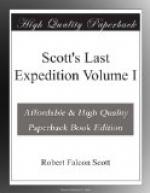The achievement of a great result by patient work is the best possible object lesson for struggling humanity, for the results of genius, however admirable, can rarely be instructive. The chief of the Scientific Staff sets an example which is more potent than any other factor in maintaining that bond of good fellowship which is the marked and beneficent characteristic of our community.
CHAPTER XI
To Midwinter Day
Thursday, June 1.—The wind blew hard all night, gusts arising to 72 m.p.h.; the anemometer choked five times—temperature +9 deg.. It is still blowing this morning. Incidentally we have found that these heavy winds react very conveniently on our ventilating system. A fire is always a good ventilator, ensuring the circulation of inside air and the indraught of fresh air; its defect as a ventilator lies in the low level at which it extracts inside air. Our ventilating system utilises the normal fire draught, but also by suitable holes in the funnelling causes the same draught to extract foul air at higher levels. I think this is the first time such a system has been used. It is a bold step to make holes in the funnelling as obviously any uncertainty of draught might fill the hut with smoke. Since this does not happen with us it follows that there is always strong suction through our stovepipes, and this is achieved by their exceptionally large dimensions and by the length of the outer chimney pipe.
With wind this draught is greatly increased and with high winds the draught would be too great for the stoves if it were not for the relief of the ventilating holes.
In these circumstances, therefore, the rate of extraction of air automatically rises, and since high wind is usually accompanied with marked rise of temperature, the rise occurs at the most convenient season, when the interior of the hut would otherwise tend to become oppressively warm. The practical result of the system is that in spite of the numbers of people living in the hut, the cooking, and the smoking, the inside air is nearly always warm, sweet, and fresh.
There is usually a drawback to the best of arrangements, and I have said ‘nearly’ always. The exceptions in this connection occur when the outside air is calm and warm and the galley fire, as in the early morning, needs to be worked up; it is necessary under these conditions to temporarily close the ventilating holes, and if at this time the cook is intent on preparing our breakfast with a frying-pan we are quickly made aware of his intentions. A combination of this sort is rare and lasts only for a very short time, for directly the fire is aglow the ventilator can be opened again and the relief is almost instantaneous.
This very satisfactory condition of inside air must be a highly important factor in the preservation of health.
I have to-day regularised the pony ‘nicknames’; I must leave it to Drake to pull out the relation to the ‘proper’ names according to our school contracts! [24]




